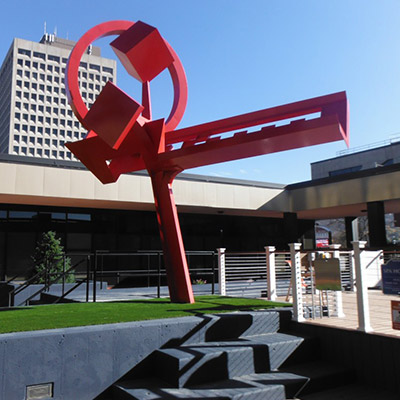Reviewed by George Basler
When Cabaret first opened on Broadway in the mid-1960s, the show was daring, combining splashy musical numbers with a dark plot about the rise of Nazi Germany.
More than five decades later, the show still strikes a nerve. In fact, its theme about the evils of extreme nationalism and the scapegoating of certain groups feels disturbingly relevant in today’s political climate.
Both the surface razzmatazz and serious undertones of this great musical are on full display in a production that opened Thursday (March 8) at the Jewish Community Center in Vestal and will continue on the weekend.
The production by Jan DeAngelo & Company does a first-rate job in presenting a flashy evening of entertainment while capturing early 1930s Germany when social turmoil, caused by the Great Depression, led to the rise of Hitler and the Nazi Party.
DeAngelo, the director, and Katie Barlow, the choreographer, effectively stage the jaunty song-and-dance numbers. At the same time, they capture the poignancy and heartbreak of characters caught in a society that is careening toward disaster. The lighting, set and costumes meld together to create the seedy world of the Kit Kat Club, a third-rate cabaret where much of the action takes place.
Of course, DeAngelo and Barlow have rich material to work with. Based on Christopher Isherwood’s 1939 novel, Goodbye Berlin, by way of John Van Druten’s 1951 play, I Am a Camera, Cabaret features a masterful book by Joe Masteroff and classic songs by John Kander and Fred Ebb. “Willkommen,” “Money,” “Maybe This Time” and “Cabaret” stand out.
To its credit, the production doesn’t play it safe. It uses Sam Mendes’ 1998 revival as its template. That staging added even more sleaze and darkness to Masteroff’s original book.
This is most apparent in the character of the Emcee at the Kit Kat Club. Gone is the formal tuxedo worn in the original production. In its place are ratty underwear, rouge and nipple glitter.
The character symbolizes the rottenness underneath the glitter of the cabaret world, and Josh Wallenstein plays him superbly. The performance is both darkly humorous and repulsive, which is a difficult mixture to pull off.
There is also a hint of homosexuality and self-loathing in the characterization, which makes the final scene one of the most emotionally devastating in the history of Broadway musicals. DeAngelo stages the scene with great skill, and Wallenstein brings it off.
Other members of the large cast do fine jobs as well.
Shannon DeAngelo gives a terrific, multi-faceted performance as Sally Bowles, a hedonistic English cabaret singer, who is the centerpiece of the show. This is no small task because the character is a complex one, veering from a likeable free spirit to a pathetic figure by the end of the musical.
DeAngelo acts the part well and sings both ballads and up-tempo numbers in a compelling fashion. Most impressive are her renditions of “Maybe This Time,” which shows Sally’s hopefulness, and the title number, which reflects the character’s self-delusion and foreshadows her tragic end.
My only quibble is that DeAngelo’s English accent seems a bit forced at the beginning of the show, although I adjusted to it as the evening went on.
Shan Towns is solid as Clifford Bradshaw, a square-jawed American novelist who falls for Sally. The character is the most underwritten and, quite frankly, least interesting in the show. But Towns has his moments, especially toward the end when the character realizes his love affair with Sally is doomed. He does a commendable job.
What raises the show to the next level, though, is the sub-plot involving the relationship between a middle-aged landlady (played by Kate Murray) and a Jewish fruit vendor (played by Joe Bardales), who becomes her suitor.
Their sweet, but ultimately tragic, love affair is the emotional heart of the show, and Murray and Bardales play it well. Bardales catches the vendor’s decency and wounded dignity. Murray superbly portrays the landlady’s world-weariness and emotional pain.
Particularly effective was her rendition of “What Would You Do?” Murray almost seems to have a nervous breakdown on stage as she sings the challenging and heartbreaking number.
Credit also goes to Julia Adams, who plays a brassy streetwalker who shares lodgings with Sally and Cliff, and Ciano Briga as a friendly German whose hail-and-well-met personality disguises his Nazi sympathies.
Overall, the singing and dancing of the entire ensemble was most impressive. The six-person orchestra, directed by DeAngelo, provides a crisp accompaniment.
Cabaret is a musical that makes you think — and even disturbs you — while providing an evening of solid entertainment. The Jan DeAngelo & Company production does it justice.
IF YOU GO: Cabaret will be performed at 7:30 p.m. Saturday and 3 p.m. Sunday (March 10 and 11) at the JCC, 500 Clubhouse Road, Vestal. (There is no March 9 performance.) Tickets are $15 for cabaret-style general admission. Call 724-2417.




































